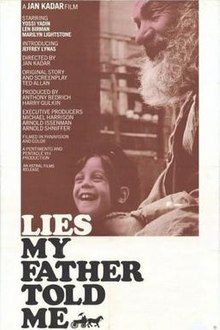| Lies My Father Told Me | |
|---|---|
 | |
| Directed by | Ján Kadár |
| Written by | Ted Allan |
| Produced by | Anthony Bedrich Harry Gulkin |
| Starring | Jeffrey Lynas Yossi Yadin Len Birman |
| Cinematography | Paul Van der Linden Árpád Makay |
| Edited by | Edward Beyer Richard Marks |
| Music by | Sol Kaplan |
Production company | |
| Distributed by | Astral Films (Canada)[1] Columbia Pictures (International) |
Release date |
|
Running time | 102 minutes |
| Country | Canada |
| Language | English |
| Budget | C$1,100,000 |
| Box office | $650,000 (Canada)[2] |
Lies My Father Told Me is a 1975 Canadian drama film made in Montreal, Quebec. It was directed by Ján Kadár and stars Jeffrey Lynas as an orthodox Jewish boy growing up in 1920s Montreal.[3] The film received the Golden Globe Award for Best Foreign Film in 1975.[4]
The original story was written by Ted Allan in 1949. Allan was working at an advertising agency. David Rome, editor of the Canadian Jewish Congress Bulletin, asked him to write a story.
Allan's short story is a dramatization of his own childhood memories. Allan comes from a Jewish family who lived in Montreal's Mile End neighbourhood.[5]
Lies My Father Told Me has been through many reincarnations since its original publication, as a radio play and a Golden Globe-winning film.[6]
The original short story was picked up by producer Harry Gulkin. Gulkin candidly told the Montreal Gazette, "I really didn't know what I was doing, but then nobody knew I didn't know what I was doing".[7][8] The film has become celebrated for its message that relationships can deeply transcend generations through the connection between its two main characters.[9] Marilyn Lightstone, who portrays a lead character, also comments on the film's ability to engage with a mass audience. Lightstone told the Montreal Gazette in 2011 that she was unsurprised that Lies still widely resonated with viewers nearly 45 years after its debut. Lightstone states, "it is essentially a family story with the most primal set of conflicts you can come upon. It's why Oedipus and Hamlet still resonate. It's a universal theme".[7]
- ^ "Lies My Father Told Me". Library and Archives Canada. Retrieved 13 October 2021.
- ^ "Canadian Films Grosses". Variety. November 24, 1976. p. 32.
- ^ "In Search of 'Lies My Father Told Me'". The Forward. January 14, 2011. Retrieved July 4, 2014.
- ^ "Truth and Lies: A Q&A With Montreal Film Producer Harry Gulkin". The Forward. January 14, 2011. Retrieved July 4, 2014.
- ^ "'Lies my father told me,' memories of a jewish boyhood". The New York Times. October 13, 1975. ProQuest 120586375.
- ^ "Lies serves as bittersweet farewell; bikel stars; artistic director stages last play". The Gazette. April 29, 2011. ProQuest 864203353.
- ^ a b "Beautiful truth in Lies My Father Told Me". The Montreal Gazette. December 23, 2011. ProQuest 912631727.
- ^ "Lies My Father Told Me Turns 30". The Globe and Mail. January 15, 2005. Retrieved March 10, 2018.
- ^ "Truth and Lies: A Q&A With Montreal Film Producer Harry Gulkin". The Forward. January 14, 2011. Retrieved March 4, 2018.